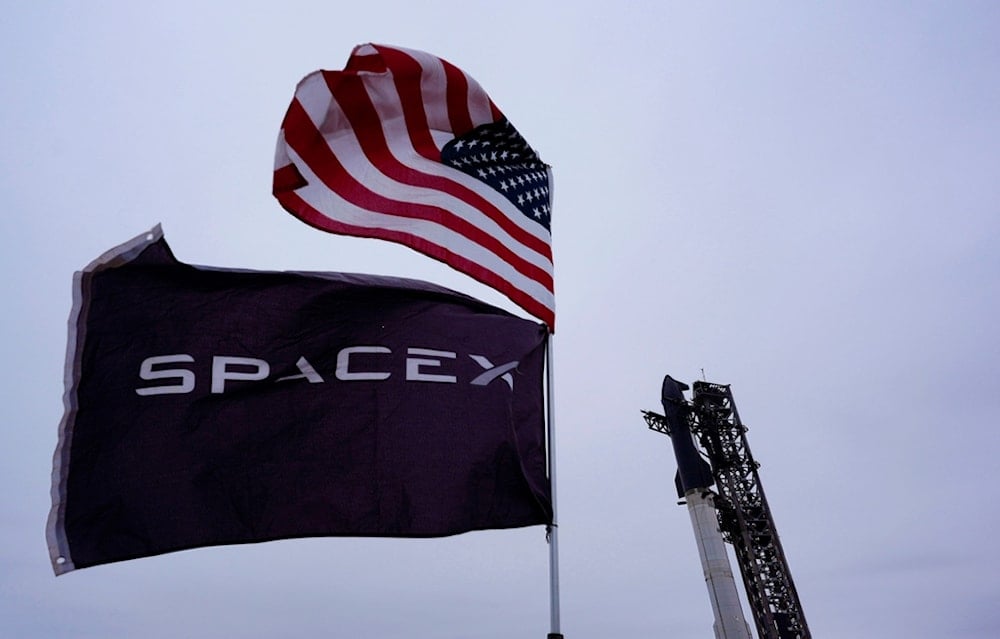SpaceX leads bid for Trump’s 'Golden Dome' missile shield: Reuters
SpaceX, Palantir, and Anduril lead efforts in Trump’s Golden Dome missile defense plan, proposing satellite surveillance and subscription-based systems.
-
 SpaceX's mega rocket Starship is prepared for a test flight from Starbase in Boca Chica, Texas, Sunday, January 12, 2025 (AP)
SpaceX's mega rocket Starship is prepared for a test flight from Starbase in Boca Chica, Texas, Sunday, January 12, 2025 (AP)
Elon Musk’s SpaceX, along with Palantir Technologies and drone manufacturer Anduril, has emerged as a frontrunner in President Donald Trump’s ambitious “Golden Dome” missile defense initiative, Reuters reported, citing six sources familiar with the matter.
The three companies—each founded by prominent Trump supporters—are reportedly competing to develop the surveillance and tracking components of the Golden Dome missile defense system. In an executive order dated January 27, President Trump labeled missile attacks as “the most catastrophic threat facing the United States.”
SpaceX, Palantir, and Anduril take the lead
Musk, who has contributed more than $250 million to Trump’s campaigns, currently holds a special advisory role in the administration via the newly established Department of Government Efficiency. Although the Pentagon is said to favor the consortium led by SpaceX, insiders noted that the Golden Dome program remains in early planning and subject to change.
The companies recently presented their proposal to senior officials at the White House and Pentagon. The plan involves deploying between 400 and over 1,000 satellites for missile detection and tracking. An additional 200 satellites equipped with intercept capabilities—such as lasers or missiles—have been proposed, though sources clarified that SpaceX is not expected to participate in weaponization.
One source described the process as a break from tradition, saying, “There’s an attitude that the national security and defense community has to be sensitive and deferential to Elon Musk because of his role in the government.”
SpaceX and Musk have not publicly commented on the potential contract. Musk responded on X to a Reuters article, stating only, “This is not true.”
Surveillance satellites and a subscription model
In a notable shift from standard practice, SpaceX missile defense contributions may be offered through a subscription-based defense system, whereby the government pays for access rather than owning the infrastructure. This model could potentially sidestep conventional procurement rules, enabling faster implementation.
However, Pentagon insiders have expressed concerns about long-term implications. “There are internal concerns within the Pentagon about relying on a subscription-based model for a defense system of this magnitude,” said one source.
Deliberations are ongoing over whether SpaceX would maintain ownership of its segment or whether the government would retain control and outsource operations. US Space Force General Michael Guetlein is reportedly involved, though he has not made public statements.
Retired Air Force General Terrence O’Shaughnessy, now a senior advisor at SpaceX, is said to be participating in discussions with defense and intelligence officials.
Silicon Valley vs. legacy defense giants
If selected, the SpaceX-led consortium could signal Silicon Valley’s most significant entry into the US defense sector, posing a direct challenge to legacy defense contractors such as Northrop Grumman, Boeing, Lockheed Martin, and RTX. These established firms remain in contention, with Lockheed Martin already launching a public promotional campaign.
Over 180 companies have reportedly shown interest in the Golden Dome project. Notable new defense tech entrants include Epirus, Ursa Major, and Armada. Select firms have briefed the National Security Council in recent weeks.
Deputy Defense Secretary Steve Feinberg, formerly of Cerberus Capital, is expected to play a central role in determining final contract awards. While Feinberg holds no direct ties to SpaceX, he has invested in hypersonic missile technology and has pledged to divest from his private equity holdings.
Concerns over Musk’s dual role
Musk’s dual status as both a government advisor and a potential contractor has sparked congressional scrutiny. Senator Jeanne Shaheen (D-NH) voiced concern, “When the richest man in the world can become a Special Government Employee and exert influence over the flow of billions of dollars of taxpayer money in government contracts to his companies, that’s a serious problem.”
Representative Donald Beyer (D-VA) echoed the sentiment, calling any contract awarded to Musk or his businesses “suspicious", citing his access to confidential information.
Shaheen has introduced legislation to prevent companies owned by special government employees from receiving federal contracts.
What’s next for Golden Dome?
The Pentagon has set an aggressive timeline, aiming for limited missile detection and tracking capabilities by 2026 and full-scale deployment after 2030. A confidential memo signed by Defense Secretary Peter Hegseth and obtained by Reuters calls for expedited satellite deployment.
SpaceX’s focus lies on the “custody layer”—the element responsible for identifying missile launches, tracking flight paths, and determining threat levels. The company estimates development of this system could cost between $6 billion and $10 billion. Its existing infrastructure, including Falcon 9 launch capabilities, may offer a competitive advantage.
Still, questions remain over whether Silicon Valley’s newcomers can deliver on a defense system of this scale. “It remains to be seen whether SpaceX and these tech companies will be able to pull any of this off,” one source said, as quoted by Reuters. “They’ve never had to deliver on an entire system that the nation will need to rely on for its defense.”

 5 Min Read
5 Min Read










